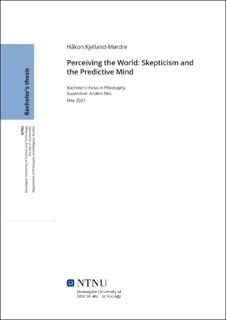| dc.contributor.advisor | Nes, Anders | |
| dc.contributor.author | Kjelland-Mørdre, Håkon | |
| dc.date.accessioned | 2023-07-05T17:20:00Z | |
| dc.date.available | 2023-07-05T17:20:00Z | |
| dc.date.issued | 2023 | |
| dc.identifier | no.ntnu:inspera:145862700:47043194 | |
| dc.identifier.uri | https://hdl.handle.net/11250/3076316 | |
| dc.description.abstract | En stadig mer populær teori i nevrovitenskapen er at hjernen er en prediksjonsmaskin. Ifølge denne teorien kan persepsjon, kognisjon og handling beskrives ved hjelp av et underliggende prinsipp, nemlig prediksjonsfeilminimering. PFM har nylig blitt et fremtredende teoretisk rammeverk også i sinnsfilosofi og kognisjonsvitenskap. Imidlertid er det uklart hva de filosofiske implikasjonene til PFM er. I denne avhandlingen diskuterer jeg hvorvidt PFM medfører skeptisisme. Hohwy (2016, 2017), en av de ledende forkjemperne for PFM, har nylig argumentert for at PFM medfører skeptisisme. Jeg presenterer argumentet Hohwy virker å gi, når han konkluderer med at PFM medfører skeptisisme. Deretter argumenterer jeg for at PFM ikke medfører skeptisisme. | |
| dc.description.abstract | An increasingly popular theory in neuroscience is that brains are essentially prediction machines. According to this theory, perception, cognition and action can all be described as the upshots of one underlying computational principle, namely prediction error minimization. By now PEM has become a prominent theoretical framework in the philosophy of mind and cognitive science as well. However, what PEM’s philosophical implications are, is far from clear. In this thesis, I discuss whether PEM entails skepticism or not. Hohwy (2016, 2017), one of the leading proponents of PEM, has recently argued that PEM entails skepticism. I present the argument Hohwy seems to be giving, when he reasons to the conclusion that PEM entails skepticism, and argue (contra Hohwy) that PEM does not entail skepticism. | |
| dc.language | eng | |
| dc.publisher | NTNU | |
| dc.title | Perceiving the World: Skepticism and the Predictive Mind | |
| dc.type | Bachelor thesis | |
